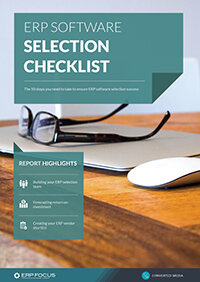Single vendor vs best of breed ERP
When deciding between a single vendor ERP or a best-of-breed solution, there is no one-size-fits-all answer. Both options have their pros and cons, and the right choice depends on your business's specific needs and operational complexities. Understanding the nuances of these two approaches is essential for making an informed decision that optimizes performance, cost and efficiency.
Single-vendor ERPs: the comprehensive choice
Single-vendor ERP systems such as Sage, SAP, Epicor and Microsoft dominate the marketplace with a complete suite of integrated modules covering all essential business operations. These ERP platforms offer solutions for finance, production, order processing, supply chain management, human resources, and more. With these systems, businesses can enjoy the convenience of using a single platform for all core functions, ensuring uniformity and compatibility across departments.
Advantages of single-vendor ERP systems
- Unified architecture: One of the most significant benefits of a single-vendor ERP is its consistent architecture. Since all modules are part of a single platform, they share the same database, user interface, and security protocols. This makes training employees easier and reduces the risk of errors.
- Seamless integration: Single-vendor ERPs are designed to work seamlessly with all included modules, ensuring smooth data flow and reducing the need for extensive custom integrations.
- Simplified support: Support is also often more straightforward because there is a single point of contact. If there is an issue with the system, it’s easier to get the right help without involving multiple vendors.
- Cost-effective maintenance: Managing a single ERP platform can be more cost-effective in the long run due to lower integration costs and fewer maintenance challenges.
Drawbacks of single-vendor ERP systems
While single-vendor ERP systems are robust, they may not always offer best-in-class functionality for specific, niche processes. For instance, a company might find that the inventory management module of an ERP system is adequate, but not as advanced as a standalone warehouse management system (WMS).
Best-of-breed ERPs: specialized functionality
Best-of-breed solutions allow businesses to pick specialized software for specific functions while integrating them with a central ERP system. Instead of relying on the general capabilities of a single-vendor ERP, companies can choose niche software that excels in particular areas like warehouse management, supply chain logistics, or e-commerce order processing.
Advantages of best-of-breed software
- Tailored solutions for specific needs: Best-of-breed systems offer specialized features that go beyond what traditional ERP modules can provide. For instance, a distribution company might need advanced slotting features or reverse logistics capabilities that a standard ERP module cannot handle. Best-of-breed WMS or supply chain solutions cater to these needs.
- Enhanced flexibility: By choosing best-of-breed systems, companies gain the flexibility to select only the tools they need, optimizing operational efficiency in areas critical to their business.
- Scalability: These systems often offer better scalability in their niche areas, providing more advanced features for businesses as they grow.
Drawbacks of best-of-breed systems
- Complex integration: One of the main challenges with best-of-breed systems is integration. Since these systems are developed by different vendors, ensuring they communicate effectively with the ERP system can be complex and costly.
- Higher costs: These solutions tend to have higher upfront and ongoing costs compared to single-vendor ERP systems. Companies must weigh the benefits of the enhanced functionality against the additional expenses.
- Multiple support channels: Unlike single-vendor ERP systems, which offer a single point of contact for support, best-of-breed solutions require businesses to maintain relationships with multiple vendors, each responsible for different parts of the system.
Best-of-breed use cases
Warehouse Management:
In industries where logistics and warehousing play a critical role, businesses often require advanced warehouse management systems (WMS). Best-of-breed solutions can include features like slotting optimization, yard management, and reverse logistics. These features go beyond what is typically available in the WMS modules of most ERP systems, providing more robust functionality to improve warehouse efficiency.
Third-Party Logistics (3PL) providers:
Third-party logistics providers often rely on best-of-breed supply chain management systems for superior visibility and control over shipping and inventory. Features like real-time tracking of shipments, multi-modal transportation management, and automated customs clearance are vital for these businesses to stay competitive.
E-Commerce businesses:
Companies that primarily operate through online sales platforms may find traditional ERP sales order management systems insufficient. Best-of-breed e-commerce order management solutions, like Magento or WooCommerce, often include specialized tools for payment processing, order tracking, and customer relationship management that are not available in standard ERP modules.
Single-vendor vs. best-of-breed: which is better?
Ultimately, the decision between a single-vendor ERP and a best-of-breed solution depends on a business's unique needs and resources. Best-of-breed systems can provide a competitive advantage in specific areas, but they come with higher costs and integration challenges. On the other hand, single-vendor ERPs offer a comprehensive solution that is easier to implement and maintain but may lack specialized features in certain areas.
Key considerations:
- Do you need highly specialized functionality in specific areas like warehouse management or supply chain logistics? If yes, a best-of-breed solution might be the better choice.
- Best-of-breed systems often come with a higher price tag, both in terms of initial setup and ongoing maintenance. If cost control is a priority, a single-vendor ERP might be a more viable option.
- Can your business handle the technical complexity of integrating multiple systems? If integration is a challenge, it might be better to stick with a single-vendor solution.
- Does your business need the flexibility to scale specific operations independently? Best-of-breed solutions provide greater flexibility for growing businesses.
Still unsure whether a single-vendor ERP or a best-of-breed system is right for your business? Get in touch with a software advisor for a free, impartial consultation. We can help assess your business's needs and recommend the best solution to ensure optimal performance and long-term success.
Free white paper

Top 20 ERP Software Comparison
Compare the top ERP systems using this guide

Featured white papers
Related articles
-

The best ERP systems for process manufacturing
Consider these ERP systems when selecting your next process manufacturing ERP
-

Secret KPI: Why Your ERP Implementation Team Matters More Than Software
Learn how Godlan ensures successful ERP implementation for manufacturers with proven strategies &...
-

5 ERP pricing definitions you need to understand
Have you mastered the ERP pricing lexicon yet? Getting to grips with these five definitions is a ...



